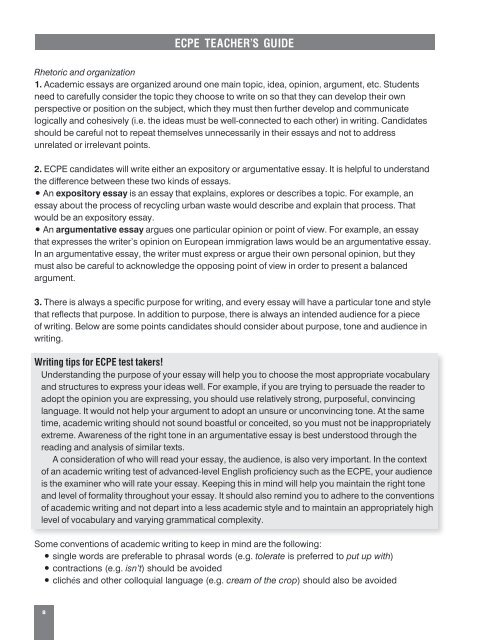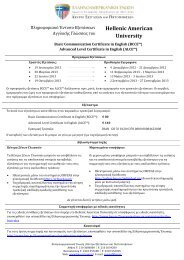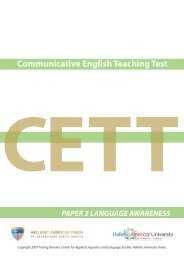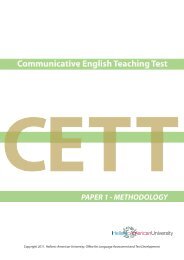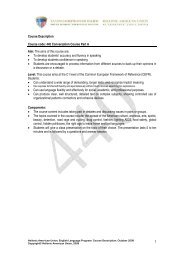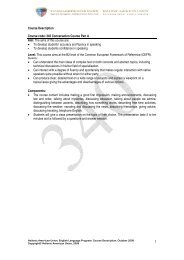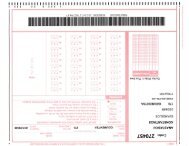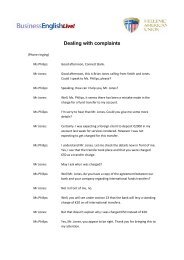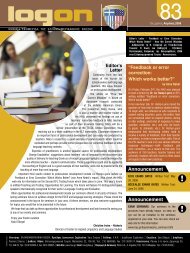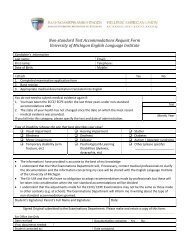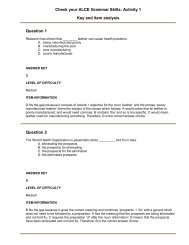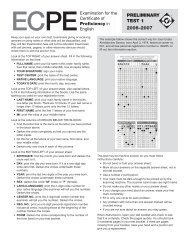ecpe teacher's guide - Hellenic American Union
ecpe teacher's guide - Hellenic American Union
ecpe teacher's guide - Hellenic American Union
Create successful ePaper yourself
Turn your PDF publications into a flip-book with our unique Google optimized e-Paper software.
<strong>ecpe</strong> teacher’s <strong>guide</strong><br />
Rhetoric and organization<br />
1. Academic essays are organized around one main topic, idea, opinion, argument, etc. Students<br />
need to carefully consider the topic they choose to write on so that they can develop their own<br />
perspective or position on the subject, which they must then further develop and communicate<br />
logically and cohesively (i.e. the ideas must be well-connected to each other) in writing. Candidates<br />
should be careful not to repeat themselves unnecessarily in their essays and not to address<br />
unrelated or irrelevant points.<br />
2. ECPE candidates will write either an expository or argumentative essay. It is helpful to understand<br />
the difference between these two kinds of essays.<br />
• An expository essay is an essay that explains, explores or describes a topic. For example, an<br />
essay about the process of recycling urban waste would describe and explain that process. That<br />
would be an expository essay.<br />
• An argumentative essay argues one particular opinion or point of view. For example, an essay<br />
that expresses the writer’s opinion on European immigration laws would be an argumentative essay.<br />
In an argumentative essay, the writer must express or argue their own personal opinion, but they<br />
must also be careful to acknowledge the opposing point of view in order to present a balanced<br />
argument.<br />
3. There is always a specific purpose for writing, and every essay will have a particular tone and style<br />
that reflects that purpose. In addition to purpose, there is always an intended audience for a piece<br />
of writing. Below are some points candidates should consider about purpose, tone and audience in<br />
writing.<br />
Writing tips for ECPE test takers!<br />
Understanding the purpose of your essay will help you to choose the most appropriate vocabulary<br />
and structures to express your ideas well. For example, if you are trying to persuade the reader to<br />
adopt the opinion you are expressing, you should use relatively strong, purposeful, convincing<br />
language. It would not help your argument to adopt an unsure or unconvincing tone. At the same<br />
time, academic writing should not sound boastful or conceited, so you must not be inappropriately<br />
extreme. Awareness of the right tone in an argumentative essay is best understood through the<br />
reading and analysis of similar texts.<br />
A consideration of who will read your essay, the audience, is also very important. In the context<br />
of an academic writing test of advanced-level English proficiency such as the ECPE, your audience<br />
is the examiner who will rate your essay. Keeping this in mind will help you maintain the right tone<br />
and level of formality throughout your essay. It should also remind you to adhere to the conventions<br />
of academic writing and not depart into a less academic style and to maintain an appropriately high<br />
level of vocabulary and varying grammatical complexity.<br />
Some conventions of academic writing to keep in mind are the following:<br />
• single words are preferable to phrasal words (e.g. tolerate is preferred to put up with)<br />
• contractions (e.g. isn’t) should be avoided<br />
• clichés and other colloquial language (e.g. cream of the crop) should also be avoided<br />
8


